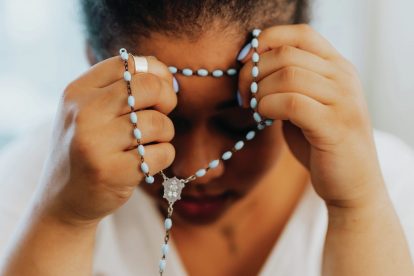Digital Edition
Tangled chains
Can praying a weekly rosary salvage fraying family ties?
Amid strained relationships and tangled chains, a family prays together.
Every Sunday afternoon, my phone whistles to remind me to send a text to the “Rose-ary Chain,” a group of roughly 25 Rose family members who pray the rosary together via Zoom every Sunday evening. This weekly gathering has kept my family connected as we grieved our mom who died just before the pandemic began. Unintentionally, it has also become a place where we encounter the often insurmountable differences present in so many families during this time of political and social unrest. The ongoing question for me is whether our family, like the linked beads on the rosary itself, can remain chained together despite the differences pulling at us.
Since our mom’s death, my brothers and I have worried about our dad, newly widowed, forced into loneliness at a time when loneliness was already drowning him. When my niece and nephew asked if we were interested in a weekly Zoom meeting to say the rosary, we jumped at the opportunity. A link was sent out, Zoom was downloaded on the computers of those over 60 who hadn’t been using it on a regular basis, and in May, six months from the day my mom passed away, our weekly Zoom rosary began.
Our collective and individual grief was heavy. It was a difficult time to be isolated from each other, but there were ways we benefited from the distance as our approach to the pandemic was not always the same. My immediate family, for example, fastidiously wore masks and practiced social distancing. We did not vote the way our state of Indiana voted in the last election. Meanwhile, a significant portion of the rest of my family—most notably my brothers and aunts—put their vote elsewhere and bristled at the restrictions placed on them by their governor.
But our weekly rosary provided an opportunity to stay linked in the shared reflection of each other’s grief. Week by week, we prayed with our dad, a convert, who led us, his cradle Catholic kids. Our thumbs and pointer fingers collected momentum as we moved from bead to bead across the chain through the first three Hail Marys and asked for the gifts of faith, hope, and love. My dad’s voice often cracked as he recited the words, and from across the Midwest where our immediate families have scattered, we jumped in to fill in the cracks where grief bubbled up. For each decade, my dad called on individual families—my brother and his wife and kids in Toledo, Ohio; my nephew and his family in Grand Rapids, Michigan; and my family in Fort Wayne, Indiana—to lead the call and response linking all of us from state to state and family to family.
The closer we came to election season, however, the connections our rosary practice made possible began to break apart with political commentary infiltrating our prayer time. In the minutes before we started, an aunt argued the novel coronavirus wasn’t real because she’d never met anyone with it. Others complained about mask mandates and civil liberties. When Joe Biden was elected, many of the rosary chain asserted dead people had voted him into office. When my 11-year-old son asked that we pray for George Floyd, someone laughed.


